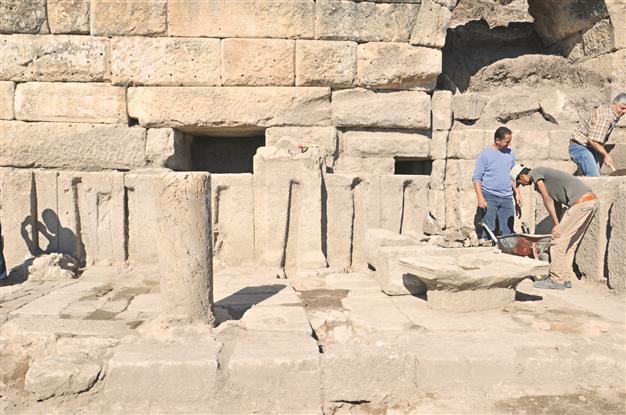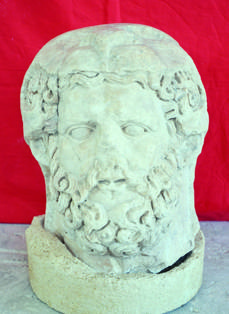Bust of Heracles emerges from ancient city
BURDUR – Anadolu Agency

AA photos
Excavations in the ancient city of Kibyra have unearthed a new bust of Heracles from the second century A.D., the front part of which depicts a lion.
Work in Kibyra, which is located in the southern province of Burdur’s Gölhisar district, are being headed by Mehmet Akif Ersoy University Archaeology Department academic Şükrü Özdoğru.
One of the excavation team members, Dicle University’s İsmail Baytak, said they had found the bust in a foundation in the agora of the ancient city.

Noting that the most important feature of the bust was the depiction of
the lion, Baytak said: “This bust has great importance. We made a review
of the literature and realized that such a bust has never been seen in
this region and in other museums. It is the first and only of its type
that makes us very pleased.”
Baytak said the workmanship on the
bust pointed to the second century A.D., the era of the Antonine
dynasty. “You can see the eyes of the lion in the upper part of the bust
and its manes in the back side. These manes do not belong to Heracles
but the lion. In mythology, Heracles already has the feature of a
demi-god. The depiction of the lion represents power.”
Baytak
said the bust would be cleaned and preserved in a depot. “Heracles puts
the fur of the lion on his head and ties it to his own body. We have
removed the head of the bust only,” he added.
In Greek
mythology, Mycenaean king Eurystheus asked Heracles to kill the Nemean
lion as one of the 12 labors he was assigned; upon completing the task,
Heracles donned the feline’s fur.
The academic said they would
give the bust to the Burdur Museum after the end of the excavation
season and were planning to unearth the other section of the statue
during next year’s excavations.
A divine hero, HeraclesIn Greek mythology, Heracles is a divine hero. He is the son of Zeus and Alcmene, and great-grandson (and half-brother) of Perseus. He enjoyed celestial power from the day he was born. When he turned 18, he killed a famous monster living in the Kitharion forests. As an award, he was given the daughter of Thebai king, Megara.
Driven mad by the goddess Hera, Heracles killed his three children and wife. To atone for the crime, Eurystheus ordered him to carry out 12 labors, which included slaying the lion and the hydra and capturing Cerebrus from Hades, among others.

 Noting that the most important feature of the bust was the depiction of
the lion, Baytak said: “This bust has great importance. We made a review
of the literature and realized that such a bust has never been seen in
this region and in other museums. It is the first and only of its type
that makes us very pleased.”
Noting that the most important feature of the bust was the depiction of
the lion, Baytak said: “This bust has great importance. We made a review
of the literature and realized that such a bust has never been seen in
this region and in other museums. It is the first and only of its type
that makes us very pleased.”